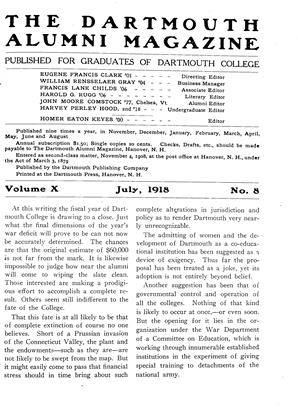War Administration of the Railways inthe, United States and Great Britain. FRANK HAIGII DIXON AND JULIUS H. PAEMELEE, Published by the Oxford University Press for the Carnegie Endowment for International Peace.
This volume is not a single essay of joint authorship but is made up of two distinct and separate monographs. The first, by Professor Dixon, relates to the war-time work of the railways of the United States throughout our railway history, but has special reference to the period 1914-1917. Mr. Parmelee, author of the second half of the volume, gives an account of the legislation—a series of laws the chief of which dates from 1871—providing contingently for government operation of railways in the United Kingdom and recounts the main facts in the history of that operation from its beginning, August 5, 1914.
The satisfactory operating results of the English experiment attest its wisdom. Moreover, in guaranteeing pre- war earnings, as of the year 1913, and by retaining any excess, the government has enjoyed a good bargain struck with the carriers. A great increase in freight traffic and a marked rise in passenger fares have rendered the financial problems of the administration of the railways of the United Kingdom simple and easy.
Professor Dixon's work is largely the record of a voluntary and earnest, but not wholly successful co-operative effort of our privately managed railways to handle an unprecedented volume of freight and passenger traffic under the stress of war conditions. The qualified success of voluntary co-operation is attributed in large part to conditions other than inefficiency of private operation. The Anti-trust Act, the anti-pooling section of the Act to Regulate Commerce, a "decentralized condition of government authority that resulted in conflict of instructions and a failure to work out thoroughly and effectively the principle of priority," obstructions and delays interposed by state regulating bodies, steadily rising costs of operation, inadequate shipping and port facilities,—all these factors combined to impair the efficiency of the carriers and to make welcome the prospect of financial relief through government control.
The volume under review contains an introductory note by the director, an editor's preface, a foreword by the authors, eleven interesting chapters and five appendices. It is an important unit of a timely and valuable series.
Professor J. M. Poor is the author of "George Ray Wicker, Beta '90." This tribute to the late Professor Wicker appeared in the February, 1918 issue of The Shield, published by the Theta Delta Chi fraternity.
Former Professor E. D. Dickinson is the author of "A League of Nations and International Law," which appeals in the May, 1918 issue of Political Science Review.
 View Full Issue
View Full Issue
More From This Issue
Books
-
 Books
BooksHenry Bailey Stevens '12
May 1929 -
 Books
BooksAlumni Articles
JUNE 1969 -
 Books
BooksUnmet Hope
MAY 1978 By DAVID DAWLEY '63 -
 Books
BooksDistant Drum
December 1980 By Everett Wood '38 -
 Books
BooksTHE HOLY SLICE.
February 1974 By H. KARL LUTGE -
 Books
BooksGREEK PLAYS IN MODERN TRANSLATION,
December 1947 By ROYAL CASE NEMIAH.







